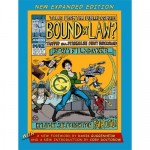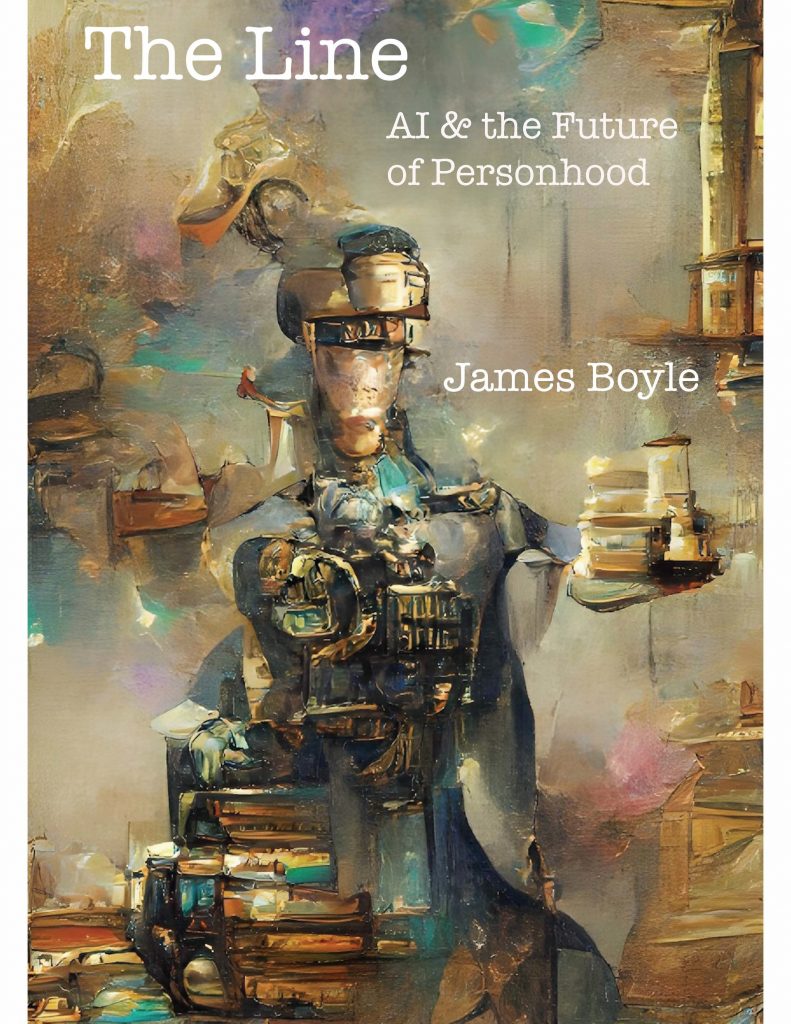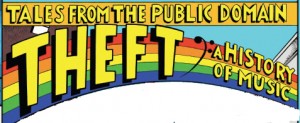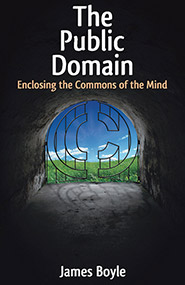I’ve had a number of questions from people who are fascinated by the idea of combining free downloads with commercial sales of the actual book. Some of them have come from authors, both academic and non. Most are interested by the idea., but are also a little unsure about its implications…
My own take is this — University presses vary widely in their receptiveness to the idea of using Creative Commons licenses. Academic authors who would like their books to be available and searchable in their entirety on the open web might want to consider Yale U.P., Duke U.P. or some other progressive university press that has already experimented with the use of Creative Commons Licenses. I have been delighted with both Yale and Duke — which has just published the new edition of Bound By Law (on left) under a Creative Commons License. So far the sales results of both experiments are positive and making one’s work freely available online is obviously congenial to our responsibility to make the result of our research available as widely as possible. Of course such licenses are not right for every book — nothing in this posting should be thought to imply otherwise — and not every press will agree, but you will not know unless you ask. (And they will not know whether the practice works unless they experiment with a few titles.)
The one piece of advice I would offer is to make sure that you really talk it through with everyone at the press and get them to understand the way the web works. While university presses might want to experiment only with a few titles, when it comes to those titles they need fully to embrace the idea — creating an excellent website for the book (or allowing the author to do so), allowing multiple formats of the book to be made available (pdf, html etc), being excited rather than horrified if the book gets mentioned on a blog and downloads spike. The last thing you want is a publisher who has grudgingly agreed to a Creative Commons license but who then sabotages every attempt to harness the openness it allows. By contrast, look at the beautiful site Yale built for my book. (Personally, I am skeptical of the whole commenting and annotation idea — but happy to experiment with it.)
“Ah — but all this is only possible because academics don’t really earn royalties on books anyway and prefer widespread dissemination of their ideas to a few extra pennies of permission fees”
Well, the latter point is certainly true, but I am unconvinced by the basic assumption that this will hurt commercial success of academic/crossover books. Most of the academics I know who have used CC licenses clearly did much better financially than those who didn’t — though this is hardly “proof” since it could be that only those with an established reputation can persuade publishers to go along, and also sell more books, get better terms and so on. We can’t prove the counterfactual.
I’d suggest a contrary hypothesis though — for an academic who wants to write a book that isn’t directly aimed at the mass market, (The Particle Physics Diet, How to Use the Secrets of Behavioral Economics to Improve your Golf Game, Secret Dating Strategies of Accountants etc.) but which has substantial potential reach in lots of different types of audience — academic and lay — the CC license might well be the best strategy in terms of sales. There the key thing is reaching your potential readers when you don’t know exactly who or where they are. And free (potentially viral) distribution does that extremely well. Yochai Benkler’s The Wealth of Networks is a nice example of this phenomenon. It turns out that many more people than one would imagine are fascinated by the economic characteristics of networks, peer production and so on.
What about professional authors? There we have fewer examples. Both Cory Doctorow, the award winning science fiction author who uses this method very successfully, and I have argued that there actually may be a big role for combined CC licensing and commercial sale in the world of commercial presses and professional authors. (Each of us discusses some current examples of the practice.) The question, of course, is whether free distribution gains you, on the margin, more paying customers than it loses you . That’s an empirical question and one subject to technological change (think of the Kindle.) But consistent with my position in Chapter 10 that we actually have a significant mental bias against the potential of open methods of production and consumption, I think the odds are that we are currently underestimating its possibilities.
Having said all that, and not scorning the delights of selling more books, my own main motivations for open licensing are rather different. Jesse Dylan’s video sums them up beautifully.










Or:
Write, create…
Self-publish and sell via Amazon, etc. Create Kindle Books.
At the same time giving away one way or another.
No license needed.
I have actually managed to wrest some books I wrote from their publishers.
Should someone use anything I have written, no problem.
Attribution is nice.
A little anarchic, but it works for me.
On Kindle I also create books from pd sources with no cr.
Ultimately I believe there will be a form of payment to online persons based on a combination of popularity and significance, more or less like page rank, with fees being collected perhaps by ISPs and doled out somewhat as ASCAP or BMI doles out royalties.
That will not happen until no one uses paper anymore.
You write, in reference to the site Yale UP has built for your book: “Personally, I am skeptical of the whole commenting and annotation idea…” Why are you skeptical about this?
Hi Mary — no real reason for the skepticism except that it seems the best examples of distributed comment and annotation happen in the context of some particular project (building an encyclopedia, annotating a book for a class or a conference.)
But as I said, I am happy to experiment and perhaps be surprised. And my skepticism is, in any case, specific and not general. As I point out in Chapter 10 we underestimate the potential of such schemes dramatically. Perhaps my reaction is another example of that!
[…] read and subscribe to Boyle’s blog on The Public Domain, which includes an excellent post on authors, academic presses, online publishing and CC licensing. Brief excerpt, emphasis added to the truth that will be so obvious to readers of this blog that […]
The initial experiment with this kind of thing wasn’t under the Creative Commons brand. Baen Books (a sci-fi publisher) started making some of its backlist available for download from its site for free without a specific license deed and without DRM.
I’ve not heard of any author who has made a good-faith effort to make some of their backlist available for free who hasn’t increased their revenue. The Science Fiction Writer’s Association has essentially been taken to task by its members for organizationally fighting any kind of open-access capability, since they never actually looked at any data about, say, Mercedes Lackey’s book sales through DAW increasing as an apparently-direct result of her putting part of her catalog up for free via Baen.
Oddly, Baen was also the only publisher experimenting with e-books at the time to actually make any money with the program. For more information, please see https://www.baen.com/library/ .
For those interested in the public domain, there’s a Wikipedia article called “List of notable people who dedicated works to the public domain“.
[…] surprising that Boyle would do this; you may be interested though in his explanation/argument for doing so. Read the comments though to see what he thinks about distributed comment and […]
[…] would be remiss not to mention James Boyle’s thoughts on the matter, particularly regarding his experience in licensing The Public Domain: Enclosing The […]
[…] would be remiss not to mention James Boyle’s thoughts on the matter, particularly regarding his experience in licensing The Public Domain: Enclosing The […]
[…] also writes on the Public Domain website about the benefits of simultaneously selling your book and giving it away. There’s a cracking video from Creative Commons at the bottom of that page, which makes a […]